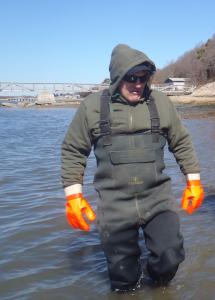Dan Warncke

Cape Cod Shellfish Industry Interviews
This is a collection of 15 interviews conducted in 2007 with people on Cape Cod who are involved in the shellfishing industry. Five people who are employed by towns to manage and regulate shellfish (Shellfish Officers), seven people who own shellfish aquaculture businesses (Growers), and four people who harvest wild shellfish commercially (Commercial Harvesters) were asked the question “What does shellfishing mean to you?”. From that starting point, questions centered on how the individual got into shellfishing and then what they thought the future of shellfishing might be.
The interviews were conducted by Sandy Macfarlane, a retired shellfish biologist and conservation administrator for the town of Orleans. The work was done under a contract with the Barnstable County Cooperative Extension Marine Program. Each interview is summarized into a written document that varies from 807 to 1557 words long and has an accompanying photograph. The interviews represent geographic, age, gender, and experience diversity as well as shellfish species diversity. All interviewees are year round residents of Cape Cod. One theme that emerged from this work is that shellfishing remains an important component of the Cape Cod economy and culture and those who are involved are concerned about its continued presence.
In 2007, Dan Warncke was a Natural Resources Officer and seasoned shellfisherman in Bourne, Massachusetts. His life and career have been inextricably linked to the waters and the shellfishing industry that defines much of the region's economic and cultural landscape. With years of hands-on experience, Warncke has witnessed the ebb and flow of the industry, adapting to the changes and challenges that have come with time. His personal narrative offers a unique perspective on the evolution of shellfishing in Cape Cod, reflecting both the traditions of the past and the shifting tides of the present.
Scope and Content Note:
The interview with Dan Warncke provides a comprehensive overview of his involvement in the shellfishing industry on Cape Cod. It delves into the significance of shellfishing for Warncke, both as a livelihood and a way of life, and explores his extensive experiences within the sector. He discusses the first part of his career working in the wild shellfisheries and aquaculture, long line suspension of oysters and mussels, his family's involvement with fishing and shellfishing and water quality work, and how he transitioned to working for the Town of Bourne. Key themes discussed include the decline of commercial fishing, the transition towards aquaculture, and the environmental factors affecting shellfish populations. Warncke's account sheds light on the economic and cultural importance of shellfishing to the local community, offering insights into the personal and communal impacts of industry changes. The interview serves as a valuable contribution to understanding the complexities and nuances of shellfishing on Cape Cod, capturing the voice of an individual deeply connected to this way of life.
Please Note: The oral histories in this collection are protected by copyright and have been created for educational, research and personal use as described by the Fair Use Doctrine in the U.S. Copyright law. Please reach out Voices@noaa.gov to let us know how these interviews are being used in your research, project, exhibit, etc. The Voices staff can help provide other useful resources related to your inquiry.
The NOAA mission is to understand and predict changes in climate, weather, oceans, and coasts, to share that knowledge and information with others, and to conserve and manage coastal and marine ecosystems and resources. The Voices Oral History Archives offers public access to a wide range of accounts, including historical materials that are products of their particular times, and may contain offensive language or negative stereotypes.
Voices Oral History Archives does not verify the accuracy of materials submitted to us. The opinions expressed in the interviews are those of the interviewee only. The interviews here have been made available to the public only after the interviewer has confirmed that they have obtained consent.
